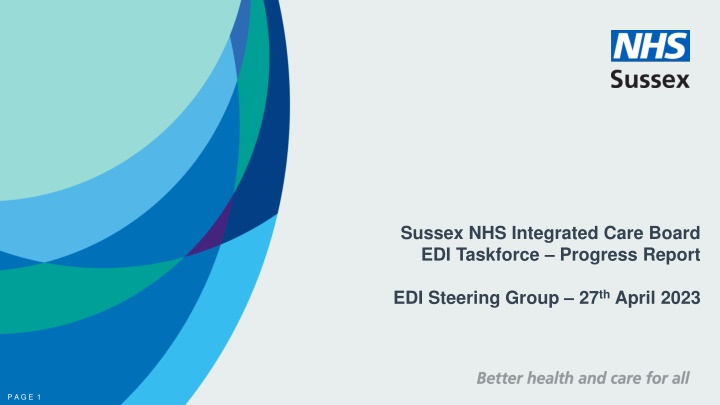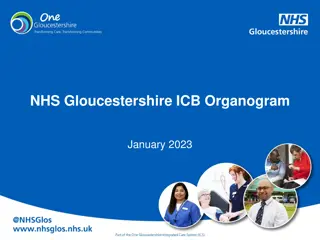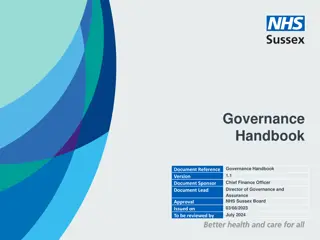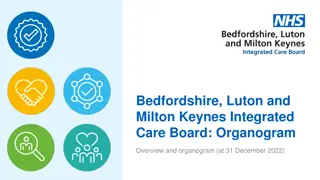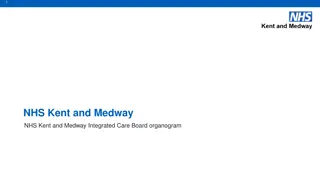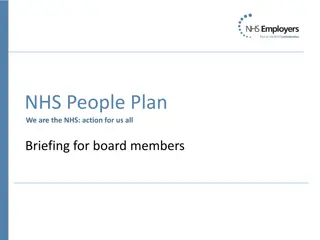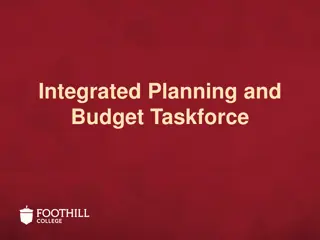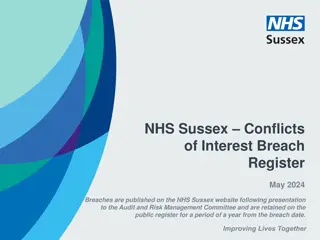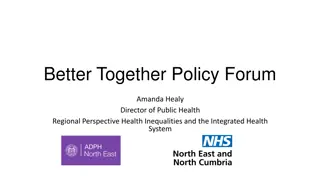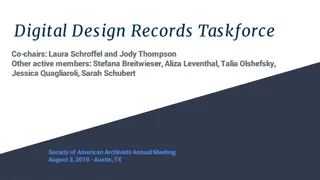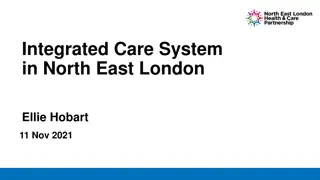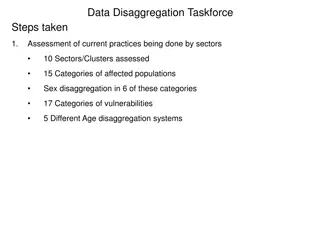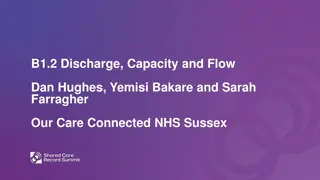Sussex NHS Integrated Care Board EDI Taskforce Progress Report
The Sussex NHS Integrated Care Board EDI Taskforce conducted a survey to assess organizational EDI performance and set a goal to reach Level 4 by April 2024. Using the Global Diversity, Equity, and Inclusion Benchmark assessment tool, progress was evaluated across various workforce culture areas. The report details recommendations and key results from the 2022 taskforce, along with current progress updates and recommendations for further improvement.
Download Presentation

Please find below an Image/Link to download the presentation.
The content on the website is provided AS IS for your information and personal use only. It may not be sold, licensed, or shared on other websites without obtaining consent from the author.If you encounter any issues during the download, it is possible that the publisher has removed the file from their server.
You are allowed to download the files provided on this website for personal or commercial use, subject to the condition that they are used lawfully. All files are the property of their respective owners.
The content on the website is provided AS IS for your information and personal use only. It may not be sold, licensed, or shared on other websites without obtaining consent from the author.
E N D
Presentation Transcript
Sussex NHS Integrated Care Board EDI Taskforce Progress Report EDI Steering Group 27thApril 2023 P A G E 1
Introduction A survey of Executive Committee members perception of organisational EDI performance was also undertaken. The NHS Sussex EDI Taskforce took place during July and August 2022. The report and recommendations were agreed by the Chief Executive and Executive Committee with an overall recommendation to reach Level 4: Progressive in eighteen months namely - April 2024. Using an International Global Diversity, Equity and Inclusion Benchmark (GDEIB) assessment tool as best practice, the Taskforce undertook a comprehensive review of ten areas of workforce culture, practice and policy. The EDI Steering Group was established to oversee this work and overall improvement journey in relation to BAU EDI workforce policy, practice and application in NHS Sussex. Task and Finish Groups (which included relevant leads and staff members from across the organisation) were set up to explore each of the ten categories of the GDEIB. This report provides a progress update to the EDI Steering Group as at April 2023 in order to establish interim progress. Through robust debate and evidence gathering, a score was attributed on a scale of 1-5; ( 1= Inactive to 5 = Best Practice). for each category with a final overall organisational score agreed as Level Two meaning: a compliance-only mindset; actions are taken primarily to comply with relevant laws and social pressures . The Steering Group are recommended to consider: Whether they support the current benchmarking position. Where, in some cases, further evidence may be required. Where, in some cases, indicators may not be relevant to the organisation. Whether further stakeholder engagement would be useful to inform final results. The benchmarking was supplemented by a baseline assessment of all quantitative and qualitative data sets in relation to reported lived experiences of staff and outcomes from an equality, diversity and inclusion perspective as well as a comparison of best practice elsewhere. P A G E 2
2022 Taskforce Results Key - Assessment Levels Overall Results No Category Name 1 VISION, STRATEGY, AND BUSINESS IMPACT Result 1.5 Score Level of Assessment Best Practice Detail Demonstrating current global best practices in DEI; exemplary. Implementing DEI systemically and showing improved results and outcomes beyond what is required or expected. A clear awareness of the value of DEI; starting to implement DEI systemically. This is what is required and expected of all organizations. A compliance-only mindset; actions are taken primarily to comply with relevant laws and social pressures. Doing the bare minimum. No DEI work has begun; diversity, equity, and inclusion are not part of organisational goals. 5 2 LEADERSHIP AND ACCOUNTABILITY 2 Progressive 4 3 DEI STRUCTURE AND IMPLEMENTATION 3 4 RECRUITMENT 1.5 5 ADVANCEMENT AND RETENTION 1.5 Proactive 3 6 JOB DESIGN, CLASSIFICATION, AND COMPENSATION 2.5 7 WORK-LIFE INTEGRATION, FLEXIBILITY, AND BENEFITS 3 Reactive 2 8 ASSESSMENT, MEASUREMENT, AND RESEARCH DEI COMMUNICATIONS 2.5 9 2.5 Inactive 1 10 DEI LEARNING AND DEVELOPMENT 2.5 Organisational Average 2.25 P A G E 3
Key Taskforce Recommendations and Progress to Date Key Green Orange Good progress Progress on track but some work outstanding No Progress Specific point of consideration Red Highlighted Yellow
Key Taskforce Recommendations and Progress to Date - 1 Key Findings The lack of an EDI strategy and detailed action plan makes direction and priority activity unfocused. Recommendations Workforce EDI Strategy established as part of NHS Sussex People Plan. High Impact Actions Develop new DEI Workforce Strategy for NHS Sussex as part of system DEI Workforce Strategy (subject to system partner agreement). Progress Update as at 27.04.23 Workforce EDI Plan agreed by Steering Group and Executive Committee due to be presented to April NHS Sussex Board. Consult and approve system Race Equality Strategy System Race Equality Strategy approved and circulated. Sussex wide Anti-Racism statement, developed, approved, and communicated EDI Steering Group established as advisory group to the Executive Committee. Sussex wide Anti-Racism statement developed and approved. Monthly meetings now in place. There is lack of leadership accountability and governance structure to support EDI. Leaders perceive themselves to be more active in this space than the evidence shows. Review and act on EDI Governance with clear reporting to the Executive Committee and Board. Greater alignment and proactivity on EDI within the Executive Committee with clear leadership actions. EDI Steering Group membership includes Network Chairs. Monthly Network chair meetings also now in place. All Executive Committee members have EDI stretch objectives. Executive Committee members have EDI stretch objectives but the Steering Group has not had sight of these. Staff networks have filled a much-needed space but feel exhausted at having to take the lead for making EDI improvements. Executive Champions to be identified and joint working relationships agreed. All Staff Networks now have Executive Sponsors. Identify Board Level Champions for each Staff Network and develop regular dialogue arrangements between Board, Executive Leadership Team, Joint Staff Committee and Staff Networks to include discussions on intersectionality. Network release time process to be agreed. Network release time policy agreed and communicated. Members of the groups gave examples of Trade Union representatives needing to have greater diversity in representation and more understanding of EDI issues so they can fully advocate for and support their diverse membership particularly at Joint Staff Committee (JSC) meetings. Discussions with Joint Staff Committee and agreed actions on diversifying representation and increasing understanding. Meetings with JSC initiated and early priorities identified including disability passports. P A G E 5
Key Taskforce Recommendations and Progress to Date - 2 Key Findings EDI resources are stretched. The small EDI team are called on to provide support and advice, but this is on a request basis. This is likely to become more apparent as system priorities are undertaken in the new ICB. Recommendations Appointment of system Diversity Director and review of EDI people team resources. High Impact Actions CPO has discussed the possibility of a Sussex system DEI team with provider CPOs. Progress Update as at 27.04.23 Decision to create a Diversity Director role not supported system wide. EDI Team resource review to be included as part of the Case for Change programme during 2023. Investment required to procure a Director of Culture to lead this programme. Data gathering and data comparison is weak with unhelpful processes and service level agreements (SLAs) with the Commissioning Support Unit (CSU). CSU People provision review to be undertaken by January 2023. Update to follow Urgent action to address gaps in workforce data and analysis and recruitment of workforce analyst role. EDI data requirements table developed by Head of EDI in partnership with CSU and shared with EDI Steering Group. To resource a People data lead for NHS Sussex. HR policies and processes exist but are outdated in relation to EDI, are not always implemented and they are not mainstreamed. Use HR Policy review recommendations to urgently update relevant HR policies. Recommendations from HR policy review to be incorporated in NHS Sussex policy refresh that is currently underway. HR Policies refreshed with EHIA for each. Rolling programme of refresh will include EHIAs. P A G E 6
Key Taskforce Recommendations and Progress to Date - 3 Key Findings Recruitment processes and the lack of panel training needs review. Several attempts have been made to improve the SLA on recruitment held with the CSU. The structures that currently exist do not support the next steps that NHS Sussex wants to take to progress EDI. As a result, there are significant limitations on data quality, recruitment policy, practice change and oversight. Talent and positive action initiatives are reactive and not part of a co-ordinated strategic approach to talent management and there is a lack of understanding about what positive action means as part of this workstream. Recommendations Urgent review and take improvement action in relation to inclusive recruitment including arrangements with the SCW CSU for in-housing recruitment. High Impact Actions Implementation of all recommendations arising from the Inclusive Recruitment project, including interviewing processes. Progress Update as at 27.04.23 All recommendations implemented and new Policy, Process and Training agreed through ExCo in January 2023. Mandatory training to be updated and all panel members must be trained prior to undertaken selection processes Training programme to be developed and introduced in April 2023. 12 Diversity Champions recruited. Review of the introduction of Inclusive Recruitment champions Evaluation and continuation of the ASPIRE programme within NHS Sussex. Establish a definition for what we mean by talent in the organisation alongside a plan for our approach to growing our workforce, which includes identification of existing talent as well as plans to attract new talent. ASPIRE programme now delivering Cohort 2 with new ASPIRING programme for Bands 2-4. Appraisal process to be reviewed to include wellbeing question. Appraisal process includes EDI and wellbeing objectives and is reviewed as part of BAU approach annually. Talent management and succession planning within NHS Sussex to be mapped out. A first draft approach has been developed to look at talent management holistically that considers succession planning, growing our workforce and wider training and development offers. Resources shared through system and region. Currently it is difficult to compare progress across all Sussex Health and Care System partners. We would want to influence and encourage all other key partner organisations to exemplify good practice. We would want to encourage them to undertake a similar exercise to assess here they are re the GDEIB. This will help in being able to compare like with like and support more joined up working. Resource to be shared through DEI Leads and Network Chairs with options for workshops so that partners can understand the NHS Sussex approach and learning. Share the GDEIB Resource and Taskforce work with partners system wide and encourage similar benchmarking. P A G E 7
GDEIB - Category Progress to Date Key Green Orange Good progress Progress on track but some work outstanding No Progress Specific point of consideration Red Highlighted Yellow
Category Progress 1: Vision, Strategy & Business Impact Category One VISION, STRATEGY AND BUSINESS IMPACT Score as at August 2022: 1.5 No 1.1 Indicator at Level 4 The organisation s EDI vision and goals to embed equity, prevent harassment, and reduce or eliminate discrimination and oppression are part of the organisational strategy. Progress The new Workforce EDI Plan, alongside the Equality and Diversity Policy, values and behaviours, leadership framework and refreshed HR Policies ensure that EDI is part of NHS Sussex vision and goals. Creating an Inclusive Environment is also one of the five pillars of the emerging People Plan. Action required to demonstrate this. Who do we mean by stakeholders? Action required to demonstrate this - how? Staff survey includes questions relating to compassionate and inclusive leadership (72.4%) and organisation respects differences (75.1%) which could be used. The EDI Taskforce examined the organisational culture and led to the creation of the new Workforce EDI Plan and related projects and programmes. Not applicable to NHS Sussex. The majority of stakeholders acknowledge that EDI is important to the success of the organisation. EDI competencies that help achieve the EDI strategy are demonstrated by most leaders and a majority of employees. 1.2 1.3 The organisation has examined its organisational culture and created strategies to eliminate inequities and reduce barriers to inclusion. DEI qualitative and quantitative goals are developed with the help of new technologies and algorithms that include input from a variety of stakeholders. The organisation invests in ethical artificial intelligence to ensure that barriers to inclusion and equity are minimised. 1.4 1.5 Not applicable to NHS Sussex. 1.6 P A G E 9
Category Progress 2: Leadership & Accountability Category Two Score as at August 2022: 2 LEADERSHIP AND ACCOUNTABILITY No 2.1 Indicator at Level 4 Leaders promote EDI initiatives, communicate the strategy, and provide recognition for EDI champions and advocates. Progress CEO sponsored and initiated Taskforce. CPO has led development of new EDI Plan and it has been discussed at Executive Committee and others. Staff Networks now have Executive Sponsors. Is anything further required for recognition of champions and advocates? The EDI plan has been presented at ExCo, Workforce and Renumeration Committee and Board who are accountable for delivery. We are currently collecting data on Board diversity although this has limitations due to some members not being our employees. Action required to demonstrate this? The leadership and board of directors are diverse, engaged in EDI issues, and accountable for achieving the EDI strategy. 2.2 Leaders are competent in applying conflict resolution skills to resolve EDI-related grievances and challenges. Leaders are rewarded for demonstrating high competency in EDI. 2.3 What might be our measures of this indicator? 2.4 P A G E 10
Category Progress 3: EDI Structure & Implementation Category Three Score as at August 2022: 3 EDI STRUCTURE AND IMPLEMENTATION No 3.1 Indicator at Level 4 The board of directors has a committee dedicated to EDI. Progress The EDI Steering Group acts as an advisory group to the Executive Committee. There is a small EDI Team comprised of Head of EDI and EDI Manager but the team works in partnership with HR/OD and others to achieve objectives. For CPO/Chair of Steering Group to complete! The organisation provides resources, staffing, and support to help ensure implementation of its EDI strategy. 3.2 The EDI function is headed by an influential leader who is knowledgeable about and committed to EDI. An organisation-wide EDI council/committee, which includes line and staff employees, is given visible and meaningful support by leaders. Diversity networks are recognised as credible, influential, and valued resources to the organization. They sometimes coordinate in recognition of their intersectionality. 3.3 The EDI Steering Group acts as an advisory group to the Executive Committee and includes Staff Network Chairs. Staff networks are considered critical to the operation and development of NHS Sussex. Some are still in the early stages of their development. Chairs meet monthly and where appropriate discuss and act on intersectionality. How would we define this? What would be success factors? 3.4 3.5 All departments/business units collaborate to ensure a holistic and integrated approach to EDI. 3.6 P A G E 11
Category Progress 4: Recruitment Category Four No 4.1 Score as at August 2022: 1.5 RECRUITMENT Indicator at Level 4 The organisation effectively recruits from representative labour markets. Progress Sussex population compared to NHS Sussex workforce diversity data has been collated and is included in the table below but needs further work to ensure accuracy and completion. It should be noted that our shortlisting to appointment ratios for race and disability remain disproportionate. Vacancies are mainly shared through NHS Jobs, however adverts are now circulated to Staff Networks and are included in the organisation s social media. Job ads are also shared with the organisation s stakeholder mailing list which includes diverse community and voluntary sector organisations. The job advert was refreshed during the inclusive recruitment review and includes positive action wording. No specific EDI websites/organisations are used e.g. Stonewall. Recruitment policy and guidance includes recommendations for diverse panels together with information about reducing bias. The new recruitment training programme also includes this information. The EDI team provides advice and has recruited 12 diversity champions to sit on panels. A new candidate and panel member experience survey was introduced in January 2023 to capture experience but this has had no returns to date. Recruitment includes advertising on EDI- focused websites and in a variety of other media 4.2 Recruitment and selection panels are diverse and knowledgeable about recruiting processes and in mitigating biases 4.3 Protected Characteristic Disability Ethnicity Gender Age Sexual Orientation Sussex Population (Census 2021) 17.6% 9% tbc tbc 4.36% identify as gay, lesbian, bisexual or other tbc 44.6 atheist; 44.6% Christian, 2% Muslim, 6.4 unknown NHS Sussex Workforce - Report as at 31 December 2022 9% 9.5% 77.6% The average age of the NHS Sussex workforce is 35-65 years. 4.3% identify as gay or lesbian and 2.3% as bisexual ESR does not collect trans identity in the workforce. 19.1% atheist, 36.6% Christian, 11% other, 29% unknown, Trans Faith P A G E 12
Category Progress 5: Advancement & Retention Category Five No 5.1 Score as at August 2022: 1.5 ADVANCEMENT AND RETENTION Indicator at Level 4 The organisation s talent management plan emphasises retention of underrepresented employees at most levels and in most functions. All employees are encouraged to consider advancement opportunities and positions outside their current functional, technical, or professional area. Progress A first draft approach has been developed to look at talent management holistically that considers succession planning, growing our workforce and wider training and development offers. The continuous conversations templates, training and guidance includes a focus on career development conversations between managers and staff. A new growing potential conversation model will be included within the appraisal guidance and process to help managers have conversations around behaviours and performance to identify potential. The ASPIRE programme was developed to respond to disparities in progression for staff in Bands 5-7 who were female, ethnically diverse and/or disabled. The new ASPIRING programme supports people in Bands 2-4. The organisation has access to a coaching network. A new system approach is being developed as a positive action mentoring scheme that will initially focus on ethnically diverse staff to then scale across wider staff groups. All line managers are encouraged to have continuous conversations about their experience of working in the organisation (but not necessarily through an inclusion and belonging lens?). Exit interviews are also undertaken with the themes shared with the People Team for continuous improvement. 5.2 The organisation counteracts bias in advancement and develops practices to overcome inequities. 5.3 The organisation has established mentoring and/or coaching processes to help ensure advancement and retention. 5.4 The organisation conducts regular stay and exit interviews to understand its culture of inclusion and belonging. 5.5 P A G E 13
Category Progress 6: Job Design, Classification & Compensation Category Six Score as at August 2022: 2.5 JOB DESIGN, CLASSIFICATION, AND COMPENSATION Indicator at Level 4 Classification and compensation systems are regularly reviewed to address inequities. There are measures in place to ensure that the role, authority, decision making, and benefits of a job do not change when a member of an underrepresented group is appointed Employees are paid for performance and outcomes rather than attendance No 6.1 Progress This process is undertaken by the NHS Nationally. There are no variations that occur when a member of an under-represented group is appointed due to the NHS Standard Terms and Conditions. NHS staff are paid for the hours, work, performance and outcomes as part of the Agenda for Change/Standard Terms and Conditions. Job description and person specification templates were reviewed as part of the inclusive recruitment work and together with the new policy, tools and training address preference and bias. NHS Sussex has implemented agile, activity based and flexible working styles for everyone, and offers the same trust and autonomy of working patterns to all staff. The leave policy includes personal, maternity, adoption, parental and compassionate leave. 6.2 6.3 Job requirements and descriptions are clear and not confused with non-job-related factors, especially those based on preferences and biases. 6.4 6.5 Job design accommodates employees need for part time or flexible work, working non-standard hours, working remotely, and taking leave for personal or other reasons. P A G E 14
Category Progress 7: Work-life Integration, Flex & Benefits Category Seven Score as at August 2022: 3 WORK-LIFE INTEGRATION, FLEXIBILITY, AND BENEFITS Indicator at Level 4 Policies and practices guard against favoritism and are communicated and applied equitably across the organisation in a culturally sensitive way. An inclusive concept of family that is multicultural and non-patriarchal guides family-friendly policies including childcare and eldercare, emergency care No 7.1 Progress NHS Sussex has an Equality and Diversity Policy and numerous other HR policies that have been considered through an EHIA. The NHS Sussex policies consider all protected characteristics through the application of EHIAs in their development. This includes parental (for both parents) leave, flexibility for child and other caring responsibilities and emergency care. Paid leave is beyond what is legally required by law and the definition of family is inclusive. 7.2 Paid leave beyond what is legally required is provided and used. The definition of family is inclusive. This may include caregiving for partners, children, and adult dependents or bereavement for extended families Using flexible work arrangements does not negatively impact employee performance, evaluation, advancement, or benefits Facilities and accommodations for meditation, religious practices, lactation, and other needs are provided 7.3 Flexible working does not negatively impact and is encouraged throughout the organisation. Each office has a multi-use wellbeing space which can be used for breastfeeding or religious practice. The Hove Town Hall offices include gender neutral toilets. NHS Sussex offers reasonable adjustments and access to work support which includes modifications to soft and hard ware. There is some evidence that this process is cumbersome and lengthy for disabled staff so this is under review. 7.4 7.5 Technology support for mobility, disabilities, mental health, and flexible work arrangements are available for employees 7.6 P A G E 15
Category Progress 8: Assessment, Measurement & Research Category Eight Score as at August 2022: 2.5 ASSESSMENT, MEASUREMENT, AND RESEARCH Indicator at Level 4 Integrated, multiple approaches to monitoring and evaluating EDI goals are implemented to track their impact, outcomes, and effectiveness. No 8.1 Progress The EDI Steering Group oversees the overall performance of the organisation in relation to workforce EDI and reports this to the Executive Committee. Multiple approaches are used to inform this including; staff engagement, staff networks, staff surveys, webinars, events and data sets including WRES, WDES and Gender Pay Gap. The EDI Team uses research, reports and external guidance to undertake improvement in EDI practice. Investment is made to ensure research is undertaken with staff groups. All staff surveys include collation and analysis of protected characteristics where relevant and appropriate in terms of data protection. The continuous conversations template includes guidance on setting EDI objectives that are then considered in annual appraisals. Staff (customer) feedback gathered through surveys, engagement, webinars and events is used to inform EDI initiatives; for example career progression through ASPIRE. Artificial intelligence is not used in NHS Sussex N/A The organisation invests in research to study EDI for both internal and external purposes. 8.2 EDI measurement is integrated into assessment tools, such as engagement surveys or cultural audits. 8.3 All employees are measured on their performance, which includes EDI goals. Information from all assessments from employees, former employees, and customers shape future EDI initiatives. Culturally competent artificial intelligence is used to identify and minimise bias in assessment tools. All organisational assessments have been reviewed from a EDI perspective and work to counteract bias. 8.4 8.5 8.6 All major policy, process and projects are assessed through EHIAs to consider equality issues and counteract bias. 8.7 P A G E 16
Category Progress 9: EDI Communications Category Nine No 9.1 EDI COMMUNICATIONS Score as at August 2022: 2.5 Indicator at Level 4 The purposes of EDI initiatives are clearly stated, and communication strategies are adapted for different stakeholders. Progress Significant learning was gathered through the launch of the ASPIRE programme in 2022 about the importance of clear communication on EDI initiatives especially where they relate to positive action. This led to clear communication about the purpose of the EDI Taskforce and will inform the staff launch of the Workforce EDI Plan. Further evidence required? There is regular focus on EDI awareness days and campaigns through the NHS Sussex webinar and weekly bulletins. The Staff Networks produce regular newsletters for their members and hold virtual or face to face meetings. Face to face events also take place for key initiatives such as the Workforce Race Equality Strategy. Vlogs/photos and videos are also used for example Ramadan. Many of these initiatives are shared with partners in the Sussex health and care system. The NHS Sussex communications team work closely with the EDI Team and Staff Networks to produce communications and resources that are culturally appropriate. Representatives of the comms team also regularly attend the Staff Network Chairs meetings and agreed comms priorities are set for the year. NHS Sussex uses a range of social media and other platforms to promote its work including EDI initiatives. This includes twitter, LinkedIn, mail chimp and newsletters, website content, intranet content, teams channels, corporate communications and webinars. NHS Sussex takes part in key calendar dates relating to culturally important EDI issues such as Black History Month, Pride and Trans Day of Visibility. Its corporate communications note any key developments that may impact negatively on staff groups; e.g. Turkish earthquake, Sudanese civil war emergency. These are done both internally and externally. Information on EDI is sent frequently and systematically through a variety of channels to employees and other stakeholders. 9.2 Communications professionals and speechwriters are knowledgeable about EDI, and they include EDI messages in general communications. 9.3 The organisation has a framework to leverage social media in both internal and external communication platforms. 9.4 The organisation proactively addresses socially-charged issues and events related to EDI internally and externally, including on social media. 9.5 P A G E 17
Category Progress 10: Learning and Development Category Ten No 10.1 Score as at August 2022: 2.5 LEARNING AND DEVELOPMENT Indicator at Level 4 EDI professionals, experts in learning methods and intercultural education, members of diversity networks, and organisational leaders are involved in the design, development, delivery, workplace application, and evaluation of EDI learning and education. EDI content is adapted and customised to the local environment, cultural nuances, languages, and social and political realities EDI learning and education involves ongoing, multi-year, developmental curricula. Progress Work is underway to develop an over arching EHIA for training design and delivery that can be applied across courses and adapted when appropriate. The overarching EHIA will enable us to respond to this indicator, with appropriate adaptions where appropriate. 10.2 The EDI Team run an annual programme of equality and diversity workshops focussed on different minority groups. There is also mandatory Equality and Diversity Training and Equality and Health Inequality Impact Assessment Training both online and face to face. This is in addition to mandatory training within is online. All training courses are opened to partners across the Sussex health and care system which includes local authorities, providers and the third sector. Resources on inclusive recruitment have been shared and the Sussex EDI Leads Network shares best practice approaches to policy and other programmes. Unsure of relevance to NHS Sussex? 10.3 All employees and key external stakeholders are educated on the importance of equity and ways to mitigate and remove discrimination and bias 10.4 The organization provides training to both current and new suppliers on how to engage and access supplier opportunities A variety of innovative EDI tools including micro-learning, chatbots, gaming, social media, blended learning, coaching, physical classrooms and virtual platforms, and instructor-led learning, are accessible to all employees regardless of level, location, or function 10.5 NHS Sussex undertakes a range of EDI learning approaches, which include micro- learning through videos, case studies and EDI team support. We use social media and intranet/internet platforms to share learning and best practice. Our EHIA training is both online and face to face and includes a repository of information and assets. Our ASPIRE programme is delivered by NHS Elect instructors in a face to face environment. The overarching EHIA will support further consideration of actions. 10.6 P A G E 18
